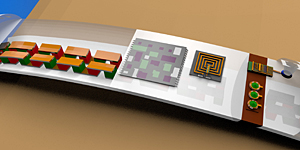National Science Foundation (NSF) has reported that North Carolina State University (NC State) will head a national nanotechnology research initiative to develop self-powered devices to monitor people’s health and know the impact of surrounding environment on it.
 ASSIST aims to produce self-powered health-monitoring devices that can be worn on the wrist.
ASSIST aims to produce self-powered health-monitoring devices that can be worn on the wrist.
The NSF Nanosystems Engineering Research Center for Advanced Self-Powered Systems of Integrated Sensors and Technologies (ASSIST) is a collaborative initiative between NC State and partners, including the University of Virginia, Pennsylvania State University, and Florida International University. The center will be headquartered in the Larry K. Monteith Engineering Research Center located on the Centennial Campus of NC State.
NSF funded an initial grant worth $18.5 million to center for five years. The grant can be renewed for another five years, followed by a two-year selection procedure by the federal agency. The center also comprises nearly 30 industry partners and five affiliated universities in its worldwide research consortium.
ASSIST scientists will devise self-powered health monitoring devices and sensors by utilizing nanomaterials, piezoelectric and thermoelectric materials, which generate power using the body motion and heat as a source. They want to make the devices to be worn in many ways as a patch on the chest, a watch on the wrist, and a cap on the tooth, based on the biological system to be monitored.
These self-powered devices eliminate the necessity to change or recharge batteries. They hold the potential in revolutionizing the healthcare industry by enhancing the way of interpreting key health data. On a larger scale, they will help lawmakers design better environmental policy. They can also play a crucial role in reducing national health care costs by helping people to take better decisions to live a healthy life.
At ASSIST headquarters, the scientists will work on the development of thermoelectric materials and nanosensors, which glean health data such as oxygen levels, heart rates and respiration data from the body. Moreover, they will develop methods to integrate their technology into wearable devices.
Penn State scientists will develop innovative energy-efficient transistors and piezoelectric materials and the University of Virginia researchers will find ways to develop energy-efficient systems, while the Florida International University scientists will fabricate sensors, which can garner the body’s biochemical signals such as stress levels.
The resulting technology together with low-power radios designed by the University of Michigan will be utilized to analyze and send health information gleaned by the sensors to consumer devices such as smart phones and computers. This data can then be easily interpreted by researchers, doctors and patients. The University of North Carolina at Chapel Hill will provide the medical guidance and organize testing the of ASSIST’s technology. ASSIST will also work with industry partners for the commercialization of its smart technology.